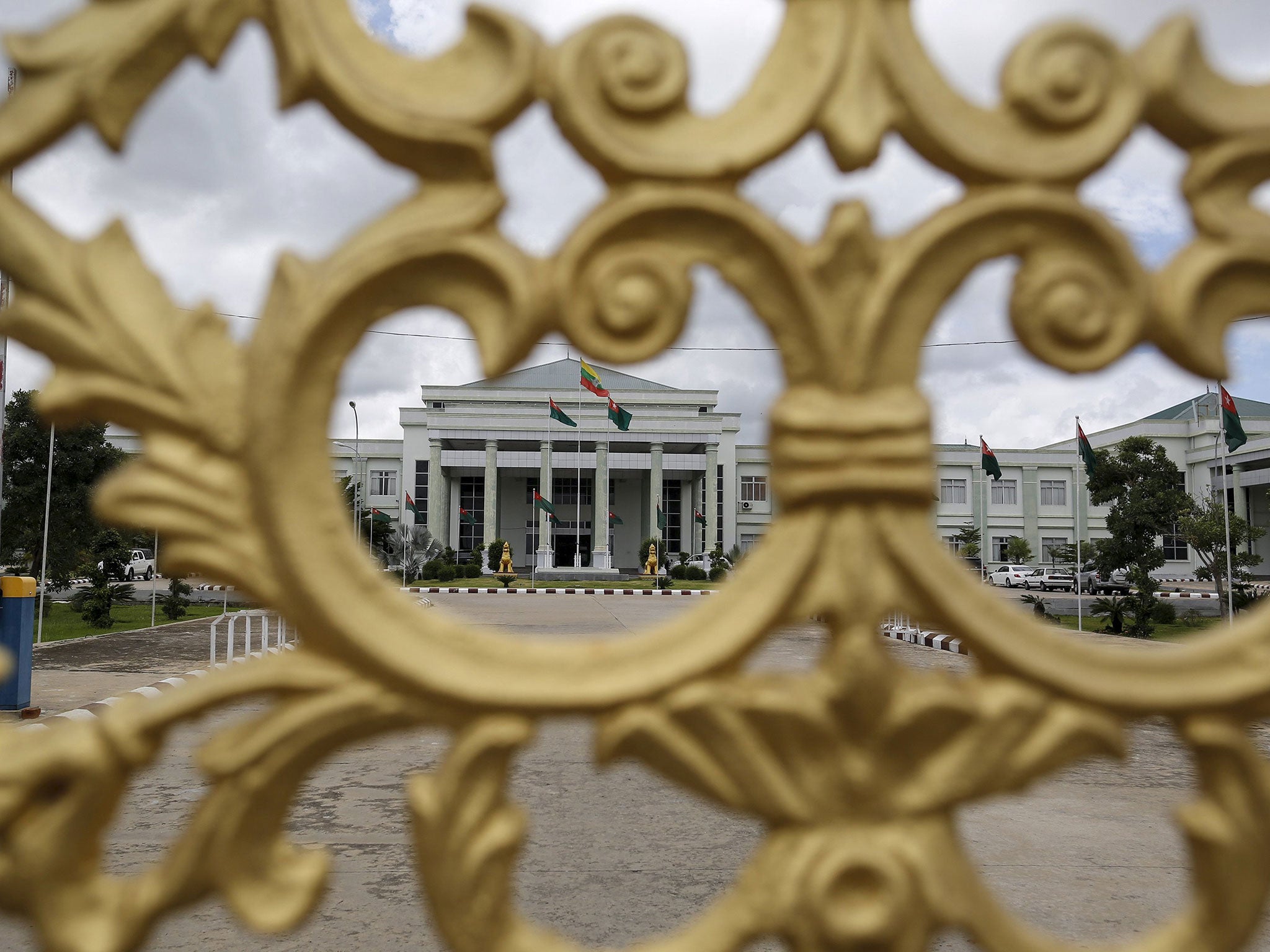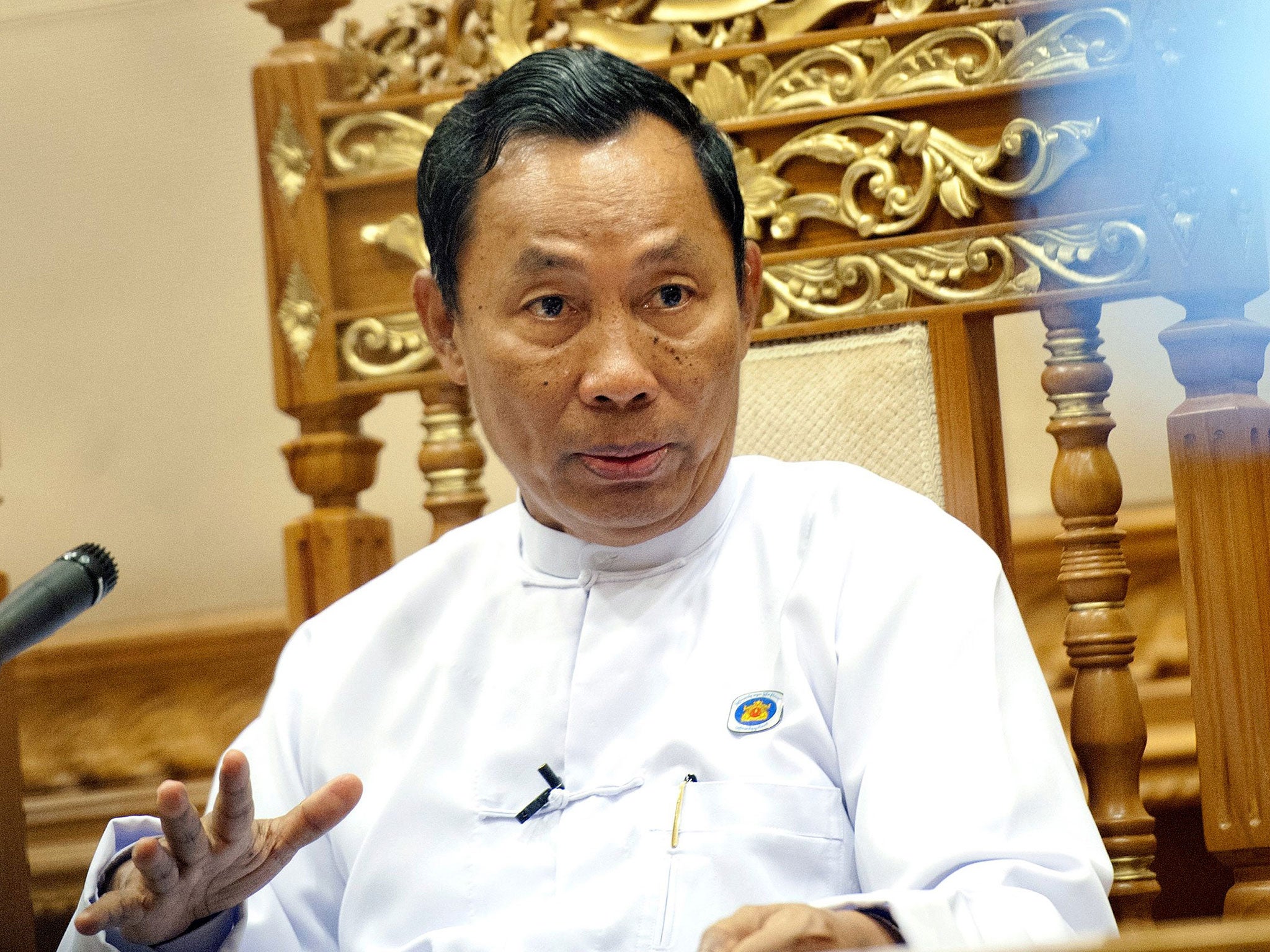Burma's move towards democracy suffers setback after 'putsch' sees Aung San Suu Kyi ally Thura Shwe Mann ousted from ruling party
The reform-minded former general was hotly tipped to become the country's next president, and some see the hand of ex-junta leader Than Shwe behind the move

Your support helps us to tell the story
From reproductive rights to climate change to Big Tech, The Independent is on the ground when the story is developing. Whether it's investigating the financials of Elon Musk's pro-Trump PAC or producing our latest documentary, 'The A Word', which shines a light on the American women fighting for reproductive rights, we know how important it is to parse out the facts from the messaging.
At such a critical moment in US history, we need reporters on the ground. Your donation allows us to keep sending journalists to speak to both sides of the story.
The Independent is trusted by Americans across the entire political spectrum. And unlike many other quality news outlets, we choose not to lock Americans out of our reporting and analysis with paywalls. We believe quality journalism should be available to everyone, paid for by those who can afford it.
Your support makes all the difference.Burma has been thrown into turmoil after the reform-minded former general Thura Shwe Mann, hotly tipped to become the next president, was ousted from the ruling party and confined to his home overnight.
In what the news website Irawaddy labelled a “putsch”, Mr Shwe Mann, Speaker of the lower parliamentary chamber and an informal ally of Aung San Suu Kyi, was replaced as chairman of the Union Solidarity and Development Party by his hardline deputy.
At 10pm on Wednesday, troops surged into the party’s huge headquarters in the capital Naypyidaw and barricaded the entrances. One of Mr Shwe Mann’s sons, Toe Naing Mann, said: “It is strange that armed forces have restricted a political party in this way.” His father has not been seen or heard from since.
Burma’s first general election since 2010 is scheduled for November and the country’s political class is seething with tension as parties and factions manoeuvre for advantage in the run-up to what should be the first free and full test of popular opinion for 25 years. Ms Suu Kyi’s National League for Democracy (NLD) won the last fair elections in 1990 but the ruling junta ignored the result and threw the MPs-elect into jail.
The deposing of Mr Shwe Mann is the culmination of a long rivalry with President Thein Sein. Both men were protégés of former strongman Senior General Than Shwe but Thein Sein beat his rival to the presidency in 2010 and oversaw the reforms that transformed Burma’s image. The changes he put into effect included the release of most political prisoners and the bringing of the NLD into the political process. As a result, Western sanctions were removed and Burma was declared open for business.
But the reform process quickly stalled and Ms Suu Kyi, who is said to have hoped for a transitional partnership with the President analogous to that between South Africa’s Nelson Mandela and F W de Klerk, became disillusioned with him. Hopes of amending the constitution, which ensures the military’s grip on the country, were dashed; crackdowns on journalists and the state-sanctioned rise of militantly nationalistic Buddhist monks indicated that hardliners were still pulling the strings.
The emergence of Mr Shwe Mann as Ms Suu Kyi’s ally was one of the few bright spots in a darkening picture. His credentials made him an improbable friend: the prefix Thura means Brave Hero and was awarded after forces under his command destroyed Manerplaw, a jungle stronghold of Karen rebels near the Thai border where NLD MPs-elect and others had retreated after the 1990 election debacle. The group included the Provisional Coalition Government of Burma, headed by a cousin of Ms Suu Kyi.

After the removal of another senior general, Khin Nyunt, in 2004, Mr Shwe Mann famously declared that “nobody is above the law”. But that was to overlook the corrupt dealings of his own sons, who are said to have become enormously rich from crooked businesses and who remain on the US’s sanctions list.
Burma’s new parliament, packed with dubiously democratic former soldiers as well as serving ones, was expected to be merely a rubber-stamp body. But under Mr Shwe Mann’s direction, it has challenged presidential power and asserted its independence.
Mr Shwe Mann enabled Ms Suu Kyi to become chair of a committee on the rule of law and riled hardliners by holding a debate on amending the constitution. Two years ago he succeeded in replacing the President as chairman of the Union Solidarity and Development Party, arguing that it was unconstitutional for the President to hold both posts.
Some observers are cynical. “Shwe Mann was using Suu Kyi to put himself in a better position in his power struggle with [President] Thein Sein,” said Mark Farmaner of Burma Campaign UK. “It backfired as the military still see Suu Kyi as toxic.”
Now the President has acted decisively to stop Mr Shwe Mann. How far he will go to remove him from the picture remains to be seen: at the time of writing he remained a party member and Speaker of the lower house.
Given President Thein Sein’s reputation for weakness and vacillation, some observers will see the hand of former Senior General Than Shwe behind the drama.
He was Burma’s hardline military ruler for two decades before retiring after the rigged 2010 general election. A diehard opponent of Ms Suu Kyi, known for storming out if a foreign diplomat so much as mentioned her name, he has not been photographed in public since his retirement. But Mr Shwe Mann’s replacement as chairman of the ruling party, U Htay Oo, a former major-general, is known to be close to Mr Than Shwe and over the past five years has been the only official source of information about him.
The former general’s overriding obsession was retaining the army’s grip on political developments. If he saw Mr Shwe Mann as moving towards an electoral pact with the NLD – widely expected to win a majority in parliament – it could have prompted him to act pre-emptively. The move came barely 24 hours before the deadline for candidates to register to contest November’s election.
Join our commenting forum
Join thought-provoking conversations, follow other Independent readers and see their replies
Comments